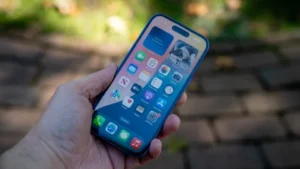Introduction
In today’s digital age, privacy and security have become paramount. As smartphone usage increases, so does the need to protect sensitive information from prying eyes. Android smartphones, being the most popular OS, are equipped with various features to ensure privacy. One of the most effective ways to protect apps from unauthorized access is through the use of app lock applications. App locks add an extra layer of security by requiring a password, PIN, or biometric verification to open certain apps.
The Need for App Locks
With the increasing amount of personal information stored on smartphones, app locks provide peace of mind. Whether it’s private messages, banking apps, or social media profiles, app locks ensure that no one but the user can access these sensitive apps. App locks are particularly useful when handing over your phone to someone temporarily, or when lending it to children.
How App Locks Work
App locks work by either using a PIN, password, pattern lock, or biometric verification such as a fingerprint or facial recognition. Once set up, the app lock will prevent unauthorized access to selected apps. When someone tries to open a locked app, they will be prompted to enter the correct unlock method.
In today’s world, mobile phones have become an integral part of our lives. Every person, every user stores various types of information on their phones. In some situations, it becomes crucial to protect our personal data or sensitive information from others. Moreover, many apps on mobile phones handle different kinds of information and can compromise our privacy. As a result, App Lock apps have become essential tools today. These apps help safeguard our personal information from unauthorized access. Some apps lock other apps using a password, PIN, or fingerprint, ensuring that no one else can access them.
Across the world, many apps provide secure locks for various apps on your phone, offering users great convenience. These apps help maintain your phone's privacy, allowing you to protect your personal information from hacking, misuse, or unauthorized access.
Firstly, these apps assist in protecting privacy-related information, photos, videos, chats, or banking details. Some apps use fingerprint recognition to provide additional security, making it difficult for anyone else to access your phone. These apps offer special features, such as locking apps with a password or PIN, which are easier to use.
Additionally, some apps provide security not only for specific apps but also for photos, videos, and other critical data. For example, certain apps lock photos, videos, and even app-specific restrictions. This way, you can keep your phone's data more secure. Apps that provide this level of protection are gaining more popularity.
Another crucial aspect for users when using these apps is the ease of use of the user interface (UI). Many apps have a user-friendly interface, making them very easy to use. These apps also offer extensive customization features, allowing you to adjust settings according to your needs. Many apps regularly add new features through version upgrades, making them even more user-friendly.
Some apps also come with unique security features. For example, after locking a specific app, you can still accept notifications related to it. These apps ensure that the frequently appearing user interface is easy to modify. In this way, these apps also highlight new features for users.
Undoubtedly, all of these features are significant, and by using them, you can protect your phone's privacy to the fullest. Ultimately, using such apps makes it much easier to keep your personal data secure and protected.
Thus, App Lock apps have become essential tools, and by using them properly, you can safeguard your data effectively.
Types of App Lock Features
- Pattern Lock: This is one of the most common and user-friendly options. It requires users to draw a pattern on a grid to unlock the app.
- PIN/Password: A traditional and secure method, this requires entering a sequence of numbers or a password to access the app.
- Fingerprint Recognition: With the rise of fingerprint scanners on Android devices, many app locks now support fingerprint authentication for faster and more secure access.
- Facial Recognition: Some advanced app locks also support facial recognition, making it even easier to access apps with just a glance.
- Time-based Locks: Certain app locks allow users to set specific times during which the apps are locked or unlocked, adding flexibility to the security settings.
Best App Lock Apps for Android
Now, let’s dive into some of the best app lock apps available for Android users.
1. AppLock by DoMobile Lab
One of the most popular app locks for Android, AppLock offers a range of features. It supports fingerprint authentication, pattern locks, and PINs. The app is known for its ease of use and smooth interface. Additionally, it allows users to lock apps, photos, and videos.
2. Norton App Lock
From the trusted cybersecurity brand Norton, Norton App Lock offers a secure way to protect your apps. It provides PIN-based and pattern lock options. Norton App Lock also comes with features such as lock themes and notifications when someone tries to access a locked app.
3. Smart AppLock (App Protector)
Smart AppLock offers a combination of security features like PIN, pattern, and fingerprint authentication. This app also includes features such as fake covers, which show a decoy screen when someone tries to access a locked app. It also supports locking individual settings within the phone, adding another layer of security.
4. AppLock – Fingerprint Unlock
For users who want a simple and intuitive experience, AppLock – Fingerprint Unlock is an excellent choice. The app focuses on providing quick and easy fingerprint-based app locks. It’s lightweight, efficient, and doesn’t take up much space on your device.
5. KeepSafe App Lock
KeepSafe is more than just an app lock. It offers a secure vault where you can store private photos, videos, and files. With a fingerprint scanner, PIN, or pattern lock, you can ensure that your personal files remain protected. KeepSafe’s minimalist design and ease of use make it a favorite among users.
6. Hexlock App Lock
Hexlock offers a unique feature where users can set different profiles based on various scenarios. You can set profiles like “Work,” “Home,” or “Night Mode,” which allows certain apps to be locked during specific times. The app supports PIN and pattern locks, and it offers a clean, user-friendly interface.
Benefits of Using App Locks
- Enhanced Security: App locks add an extra layer of security to your personal data by restricting access to sensitive apps and information.
- Privacy Protection: With app locks, you can safeguard personal chats, photos, videos, and documents from unauthorized access.
- Safe Browsing: By locking your browser or social media apps, you can ensure that no one can view your browsing history or online activities.
- App Protection for Kids: App locks are great for parents who want to protect their children from inappropriate content. Parents can lock certain apps, ensuring that kids are restricted from accessing them.
- Prevent Accidental Deletions: Locking apps like settings, messaging, or photo albums prevents accidental deletions of important data.
Choosing the Right App Lock
When selecting an app lock for your Android phone, consider the following factors:
- Compatibility: Make sure the app lock is compatible with your phone’s operating system version. Some app locks work better with newer versions of Android, while others may not function correctly on older models.
- Features: Determine the features that matter most to you. Some app locks offer advanced features like fingerprint recognition or time-based locks, while others may be more basic.
- Ease of Use: The app lock should be easy to set up and use. Look for an app with a simple interface and smooth functionality.
- Performance Impact: Some app locks can slow down your phone or use up battery life quickly. Choose one that offers high security without compromising your phone’s performance.
- Reviews and Ratings: Always check the reviews and ratings before downloading an app lock. User feedback can give you a good sense of its reliability and effectiveness.
Problems of App Locks
While app locks are highly beneficial, they also come with some Problems :
- Forgetting Your Password: If you forget the PIN, pattern, or password used to lock apps, regaining access can be difficult. Always choose a lock method that you can easily remember.
- Security Loopholes: Some app locks may have security vulnerabilities, which can be exploited by hackers or malware. Make sure you download a trusted and well-reviewed app lock.
- Performance Issues: App locks that run in the background can sometimes drain battery life or use up processing power, affecting the overall performance of your phone.
Combining App Lock with Other Security Measures
While app locks are effective, they should not be the only security measure used. Combining an app lock with other security tools, like a device lock screen (PIN, fingerprint, or pattern), antivirus software, and encryption, provides more robust protection for your data. Always keep your phone's operating system up to date to ensure you are protected against the latest threats.
Conclusion
App locks are a simple yet effective way to protect sensitive information on your Android phone. With various options available, such as PIN, password, pattern lock, and biometric features, users can choose the method that best suits their needs. Whether for securing personal data, preventing unauthorized access, or protecting children from inappropriate content, an app lock offers peace of mind in a digital world. However, it’s important to choose a trusted app lock, keep security measures updated, and combine it with other protection methods to maximize security. By doing so, you ensure that your personal data remains safe and private.








